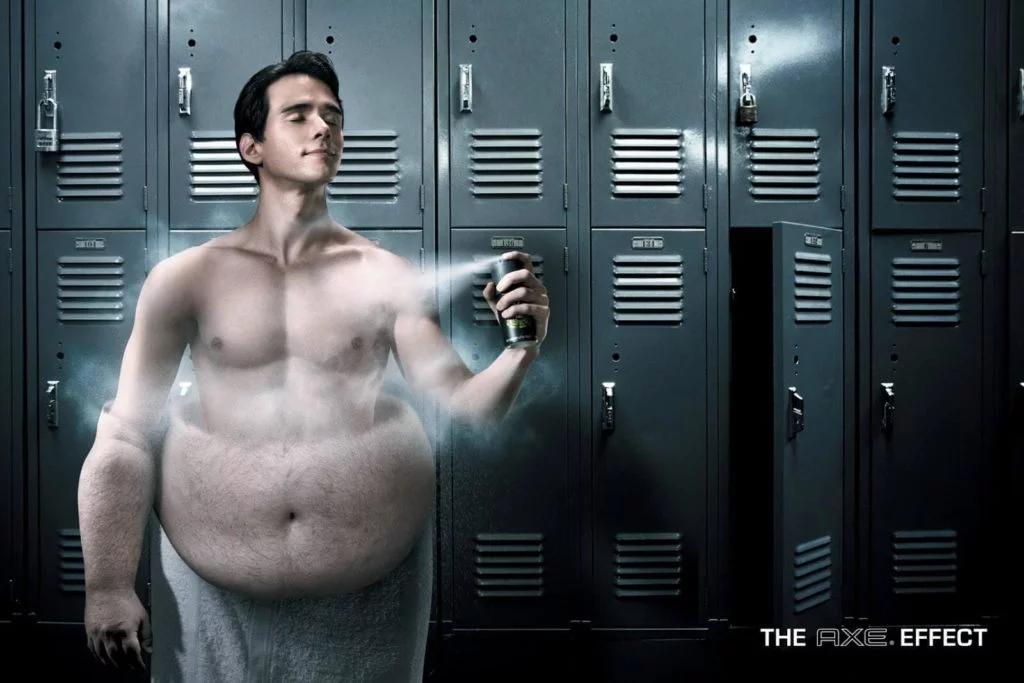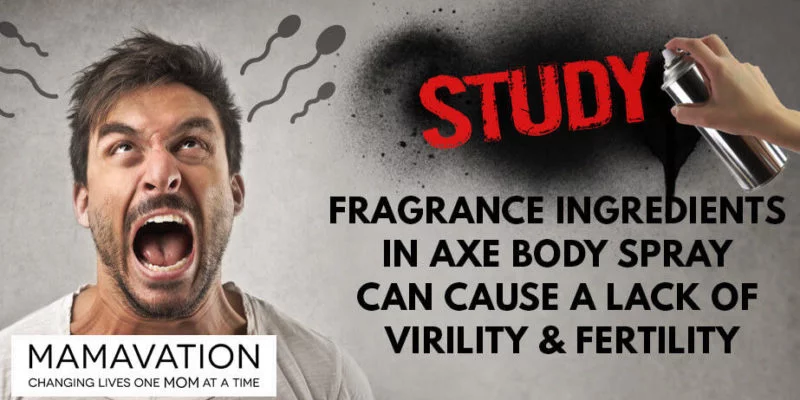That Axe Body Spray you’re bathing in before a hot date is ruining your junk! A bunch of male scientists got together to look at some common ingredients in male shampoos, body sprays & colognes. What they found was shocking. In fact, after reading this post you may decide to chuck your Axe Body Spray in the trash where it belongs. We’ve covered in detail the effects of fragrance on the human body, which I’m dubbing the new “second-hand smoke.” But just recently, more has been discovered about how the chemicals, like phthalates, in fragrances could potentially affect men and their own fertility.

You heard me right. Axe Body Spray may make you feel manly, but in reality, it’s potentially robbing you of your manhood. And I wish I was joking. A new study out of Massachusetts has linked paternal exposure to phthalates with diminished embryo quality.
Translation: You are less likely to get someone pregnant one day. So if you’re trying to smell good for that special lady, you may want to rethink dousing yourself in toxic fragrances.
You mother will want grandchildren one day. Do her a favor and put the bottle down!
via GIPHY
The more we know about phthalates, the scarier they get.
via GIPHY
Table of Contents
What are Phthalates?
Phthalates, sometimes called plasticizers, are a class of chemicals that are used to make plastics more flexible and durable. Some types of phthalates are used as solvents (dissolving agents) for other materials. Phthalates are used in hundreds of products, including:
- Vinyl flooring
- Adhesives
- Detergents
- Lubricating oils
- Automotive plastics
- Makeup
- Hair sprays & hair dye
- Shampoo & conditioners
- Lotions
- Perfume and Body sprays (such as Axe body spray!)
What are the effects of Phthalates?

via Safer Chemicals Healthy Families
There isn’t enough testing yet to know all of the effects that phthalates have on humans or the environment, but the CDC has been publishing reports since 1995 with their findings on the subject. So far, in the past few years, research has linked high phthalate levels to asthma, ADHD, breast cancer, obesity, type II diabetes, lowered IQ, neurodevelopmental issues, behavioral issues, autism spectrum disorders, altered reproductive development, and most recently, male fertility issues.
The most recent study, from the University of Massachusetts Amherst, investigates whether phthalate levels in preconception can directly affect the reproductive success and embryo quality of the subjects.
The study, led by environmental health scientist Richard Pilsner, measured the associations between phthalates and embryo quality at day five of the IVF cycle, when genome activation starts. This timing is extremely important because previous studies have measured the effects of paternal phthalate exposure at day three of the cycle, before the embryo begins genome activation, and have found no associations with embryo quality.
Pilsner’s study focused on 50 heterosexual couples undergoing IVF in Western Massachusetts. What they found, was that the Male, not female, urinary concentrations of select metabolites of phthalates and phthalate alternatives are associated with diminished blastocyst quality. Women are often “blamed” for birth defects and infant loss, but sperm quality and paternal chemical levels may have more to do with it than we think!

How can we avoid Phthalates?
Unfortunately there is no regulation on phthalates in products, and no requirement for disclosing them on packaging. It’s impossible to know the amount of phthalates we are being exposed to without special testing. Until more regulations are passed surrounding the use phthalates in consumer products, we will continue to be exposed to them on a daily basis. According to Bruce Akers, a “green” chemist who works with natural and organic brands to create cleaner product formulations, when these chemicals are used to create tubing for manufacturing or packaging for products, eliminating them becomes tough. “If you want soft, squeezable plastic,” he says, “you’re using phthalates.”
Phthalates are founds in a wide variety of products, from building materials, to parts of your vehicle, plastic clothing such as rain coats, a majority of food and drink items – yes, even organic food and drinks, and personal-care products such as makeup, hairspray, and body spray. There is no way to create a definitive list of products, containing phthalates, but avoiding products made with or packaged in soft plastics and unknown ingredients such as “fragrance” are good ways to lessen exposure.

What the heck can we do about this?!
The good news is, the CDC has recommended further testing on phthalates so we can get more information on their effects on humans and the environment in the future.
An IndieGogo campaign for an at-home toxin testing kit can test your levels of the 10 most common household toxins. (Okay fine not phthalates, but a ton of other things you should avoid) Not only can this information help you make informed decisions about the products you use in your home, but the results will also help Silent Spring Institute, a 501(c)(3) non-profit organization, generate new scientific knowledge about everyday chemical exposures and support stronger policies that protect people from dangerous chemicals in consumer products.

The most recent test in Massachusetts also opens the door for additional testing on the subject. In fact, State and federal regulations have already eliminated several select phthalates from some products, and it is likely that the list will continue to grow. In California, Proposition 65 now includes four phthalates (DINP, DEHP, BBP, and DBP) under its labeling requirements.
Big retailers may also play a significant role in the regulation of phthalates, as they have with other toxic chemicals like BPA. Both Target and Walmart have launched initiatives to reduce or eliminate toxic chemicals from their shelves last year, and you can help by reminding them to keep their promise by clicking and visiting their Facebook pages and leaving a message for Target and Walmart.
Robin Whyatt, professor of environmental health sciences at the Columbia University Medical Center, suggests that companies could use flexible polymers instead. “There are flexible polymers that don’t require a plasticizer – they exist,” she remarked. “They haven’t been studied really, so we need to know more, but they probably do not leech the way phthalates do. The problem with phthalates as plasticizers is that they’re free floating, they don’t attach to the polymer, so they leech easily. If you have a flexible polymer that shouldn’t happen.”
What else can you do? Demand more testing, demand more regulations, and continue to educate yourself about the chemicals and toxins that we encounter every day and how we can avoid them. Reach out to the big ten retailers and tell them you want to see less toxic chemicals in the stores you shop at. Phthalates are seemingly everywhere, because they are cheap and widely available, but with more demand for research and healthier alternatives we can lessen the exposure for everyone.
But Seriously How Can I Avoid Phthalates?
- Avoid and/or reduce your use of products with added fragrance.
- If you dye your hair, make sure to avoid coal tar and lead acetate.
- Avoid sunscreens with octinoxate, oxybenzone and homosalate.
- Read labels closely and find safer alternatives using tools like the Think Dirty app and GuideGuide.

Sources:
http://dx.doi.org/10.1093/humrep/dew301
https://www.cdc.gov/biomonitoring/phthalates_factsheet.html
http://saferchemicals.org/chemicals/phthalates/
https://www.theguardian.com/lifeandstyle/2015/feb/10/phthalates-plastics-chemicals-research-analysis



 Health and Beauty Benefits of The Dead Sea
Health and Beauty Benefits of The Dead Sea
If the crap gives you a headache that lasts for hours or days or even makes you nauseous….it CANNOT be good for you!!!
i dont know whats wrong with you,but axe doesn’t normally do that
I didn’t know most of the information that’s in this post, but at the same time, it wasn’t that surprising. What was surprising was that you went into more detail about phthalates, which was also intriguing to me because people always tell you they are bad, but not specifically why. It is nearly impossible to get all these chemicals out of your house, but at least when you know what can cause you harm and the products they can be found in, you will be able to make smart choices about future products that come into your home. Kudos to the comic relief you added throughout too, it was welcome and appreciated.
You’re welcome! We love to educate AND entertain if possible. XXOO
Well I’m shocked to know that fragrance can have an effect on hormones. Also very shocking that companies are playing with the health of people just for making big bucks. That’s insane.
Agreed
Even just walking by someone wearing a strong (artificial) fragrance can make me dizzy and cause a bad headache. I know not everyone is as sensitive to it, but that just can’t be a good thing.
These are the kind of people who can never work in a mall. Fortunately, there are work protections for them, but it makes life very difficult when you have a noticeable issue with fragrance. But most people do not…and the damage done is unseen. You can’t feel when tumors are developing or when your hormones are going crazy on the inside. The more they study endocrine disruption, the more we see trends in infertility, obesity, lower IQ for children, metabolic diseases like diabetes and tumors. Share with your friends because right now it’s buyer beware.
I honestly had no idea that fragrances were causing these kinds of issues. I knew they were bad, and honestly they give me a headache but I didn’t know these kinds of affects were going on. I know for our family: allergies, sensitive skin, and headaches, avoiding these types of products are key. Clearly we are making the right choice because YIKES I don’t need my son or husband to have any issues related to these nasty things!
My mother had migraines growing up. They were bad. Certain perfumes would send her into hell for HOURS.
This is a great article! For about a decade I’ve been “destinkafying” my family due to outrageous allergies.
The testing just isn’t there from the manufacturers to prove these “fragrances” are safe, so until the CDC and FDA say otherwise, I can only go by my own experiences.
I know my family’s overall allegeries have reduced by a solid 80% since reducing the “other environment factors”: mostly being chemicals, cleaners and anything fragrance; fragrance oils, sprays, perfumes and candles.
Thanks Angela!
That is really good news Tracy! Good for you!
You know I really love most of your posts but this one irks me, I am in the indie beauty industry, and have been for over twenty years now. I have to say this is just not true about fragrance, that is personally choice for sure. But Phthalates are pretty much avoided at all costs in most Indie products, and with the rebirth of Indie Natural Perfumers, and have been for years. . Most suppliers pride themselves on offering Phthalate free fragrances, to make your indie products with, and any that are left to reformulate are clearly marked as still having Phthalates in them so you can easily avoid them . To make such broad claims as this echoes the fear mongering and self appointed “authority” on the subject as far as personal care items – I am referring to the EWG and the Safe Cosmetic Act, who mislead for their own agenda, and if you look behind the curtain these two are out to only cause fear among the public to put in place such restrictive Bills to take out all small ” natural” companies and the like and they make a massive income by ” fear mongering” to generate money for the campaign runners and those who align with them, with no actual facts to back them up. Please do better research, there are thousands upon thousands of small family and individually run indie companies now, and there has been now for decades, making small controlled quality natural batches of products, and some do use fragrance and some do not, and some use natural oils only for scent. But I assure you, suppliers of these small companies have the public safety in mind, as do the Indie companies themselves, first and foremost as these are our customers we build personal relationships with for years and years. I do not know what AXE has in in it, since it smells so vile I do not get near it, but your article makes a statement so broad , and to avoid these types of items all together because of Phthalates in all Fragrance, and that is just simply not true!
If you knew how many of the ingredients in different fragrances have estrogenic properties, and that they are hormone disruptors, you wouldn’t have posted this comment.